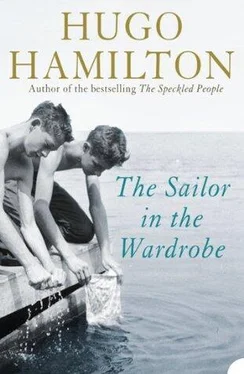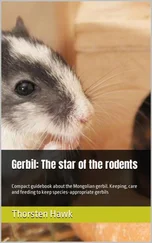As we arrived on the pier in Kilronan, the afternoon sun was shining away towards the mainland. We walked up towards the American Bar which was like the island waiting room, where people looked out to see if the boat was coming in, where men spoke about the weather and decided whether the boat would go out again or whether you might be trapped on the island for another night. The people leaving the island were heading down towards the pier and the people arriving were filling their places at the American Bar. The tourists went straight out to the promontory fort at Dun Aengus, on foot, in pony and traps, or on rented bicycles. We were staying on the other side of the island at Killeany, so we made our way past the dance hall, past the low cliffs with the ivy, out along the road towards the small fishing harbour and the white strand which they call trá na ladies or the ladies’ beach.
We explored the island over the next few days and memorized the empty landscape around us. We saw the small Aran fields and the high stone walls, made of sharp grey limestone rocks, designed to let the wind through. We noticed how the tarred road was always fringed with a line of white sand and grass. We smelled the turf smoke and heard the sound of enamel buckets as we passed by the houses. Here and there a dog accompanied us part of the way and we realized how little traffic there was on this road and what a novelty we must have been, the strangers from Dublin. We saw the air strip in the distance with a single red fire engine parked in the middle and around twenty-five island donkeys roaming freely on the grass. We were told that every one of them had an owner, but they had the freedom of the island to come and go as they pleased, laughing at everyone as they went. We ran after them and trapped one or two of them, riding them like in a rodeo, falling off as soon as they bucked with their ears down. We went out to the Glasen rocks and the cliffs facing into the Atlantic, and saw nobody out there, only the balls of foam floating in from the sea and the booming sound of the waves smashing across the terraced rocks beneath us.
From time to time, I thought I would see Stefan out there on the cliffs, silently watching the sea. I thought he would be standing alone some distance away, at the very edge of the rock, looking down at the waves pounding into the caves, just staring as if he could never turn around again or go back to Germany.
On the way back from the cliffs, we saw the men working in the fields. Sometimes we saw women and children walking along the road and we noticed that they took the side of the road, close to the wall, while we walked in the middle. Mostly we saw nobody at all and it was only after some days that we understood how empty this landscape really was, how hard it must be to live here, away from the mainland, away from the shops and crowded streets. At night, it was so dark that you could see the stars very clearly, not only the main shapes like the Plough, but a whole lacy spray of white in between. It was so dark sometimes that we had to hold our arms out in front of us and grope at the stone walls to make sure we were still on the road.
In Tigh Fitz bar in Killeany, we heard the men speaking in Irish and telling great stories. We heard the story of how a plane once landed on the island during the First World War and how the cows and horses were all frightened because they were not used to the sound of engines and motorbikes. There was one horse driven mad for weeks, running crazy all over the island, day and night, with all the islanders trying to trap him and bring him back to his senses. When a young man with a rope tied around his waist finally crept up to put a harness on the horse in a moment of exhaustion, he went fully out of his mind and ran out into the waves on the beach at trá na ladies , taking the man with him.
We heard other stories of drowning and stories of the supernatural. That’s my story, they would say. Not a word of a lie. We heard of the Hollywood director who came to Aran and found a brother and sister who were so handsome that he asked them to go back with him and spend the rest of their lives in the movies in America. When they were going away on the boat, waving at the people they were leaving behind on the pier at Kilronan, the brother suddenly changed his mind and jumped off to swim ashore again. He was rescued and pulled out of the water by his friends, while the sister stayed on board and went to America where she became a famous actress and they never laid eyes on each other again. Late at night, the men would start singing the old sean nós songs. ‘The Rocks a Bawn’ was like a hit single on the island and somebody had to sing it every night or nobody could go home. And the singer often needed to hold the hand of another living person while he sang, usually that of a stranger, winding it around like a barrel organ to keep the song coming.
We had studied The Playboy of the Western World at school, so we knew that a man would invent any story around himself in order to attract the admiration of a woman. A man would fabricate his own biography in order to get shelter and belonging, he would turn himself into anything and fit himself into any image required of him in order to be accepted. We knew that the inspiration for the play by John Millington Synge came from a story of a man who once came to the island saying he had killed his own father with a blow of a spade and was then hidden by the islanders in a hole out by Kilmurvy, while the police were searching high and low for him.
I wondered whether the people on the island would treat Stefan in the same way. If they had heard the Garda message going out on the radio, would they ignore it because they understood when a man wanted to go missing voluntarily? They knew full well, not by any description of his clothes or his appearance, but by the look in his eyes and the way he would spend his days staring at the Atlantic, that this was the German who didn’t want to go back, the man who had murdered his own father. They would say nothing, even keep him hidden from the Gardai, because they liked being on the side of the person who was trying to disappear.
We knew that the play had caused a riot when it was first performed, because Irish people didn’t like themselves to be portrayed in this way. They didn’t like Synge for giving the Aran Islanders primitive instincts and immoral ways of speaking about themselves. It was the word ‘shift’ which caused all the trouble, a word used long ago for a woman’s undergarments. We knew that the riot in the Abbey Theatre had angered Yeats and provoked him to say ‘You have disgraced yourselves,’ a phrase we often used against each other in class. And we knew that the word ‘shift’ had taken on an entirely different meaning. Now it meant getting off with, scoring, or being successful with a woman. Packer would never have used the word himself, because it was a country term which, he said, came from dancehall culture, where shifting a woman meant getting her from the inside to the outside. But we knew it meant much more and implied end results that went far beyond that, something that involved making up any amount of lies and stories. We also knew that the verb ‘bréagadh’ in the Irish language had multiple meaning. It meant telling lies as well as courting or flirting.
We got talking to some of the Killeany girls at the dancehall. They accused us of trying to grow fur on our chins to pretend that we were men. They asked if they could touch our faces and said they had felt more hair on the back of a door. We met them along the road or outside their houses, but rarely in the pub which was mostly frequented by men and tourists. They invited us into their houses for tea and barm brack, and Packer would keep talking for us all, telling great stories and turning us into amazing heroes with very interesting lives.
Читать дальше
Конец ознакомительного отрывка
Купить книгу












